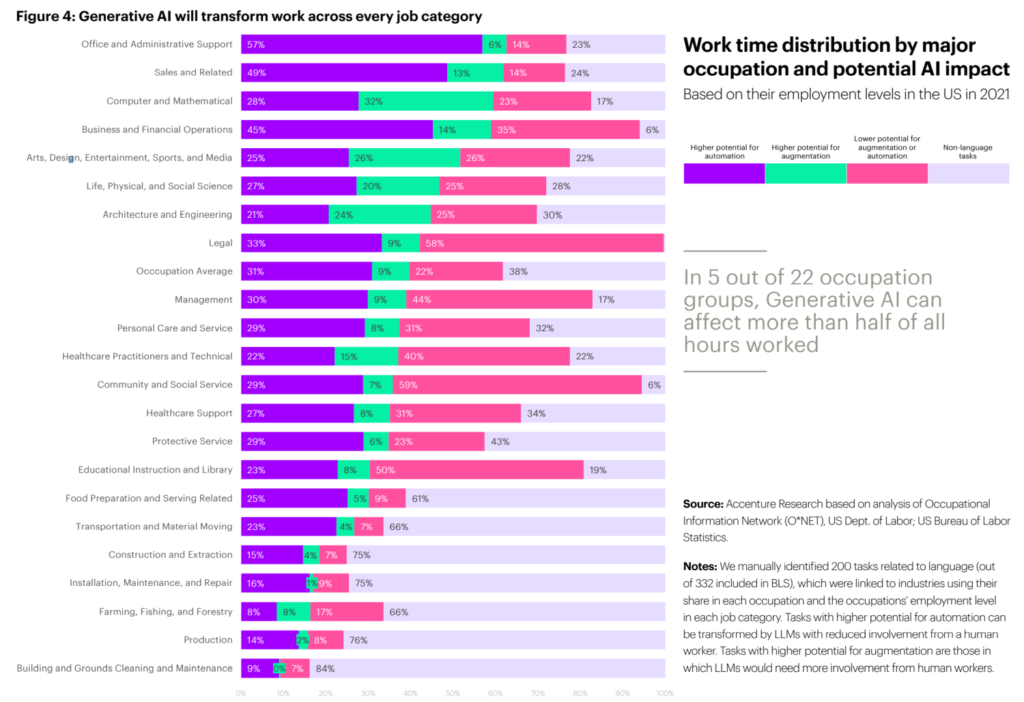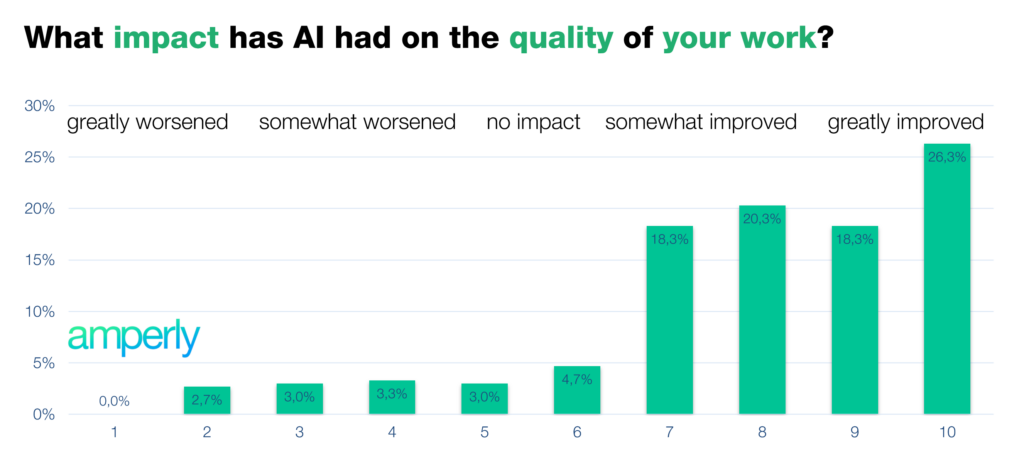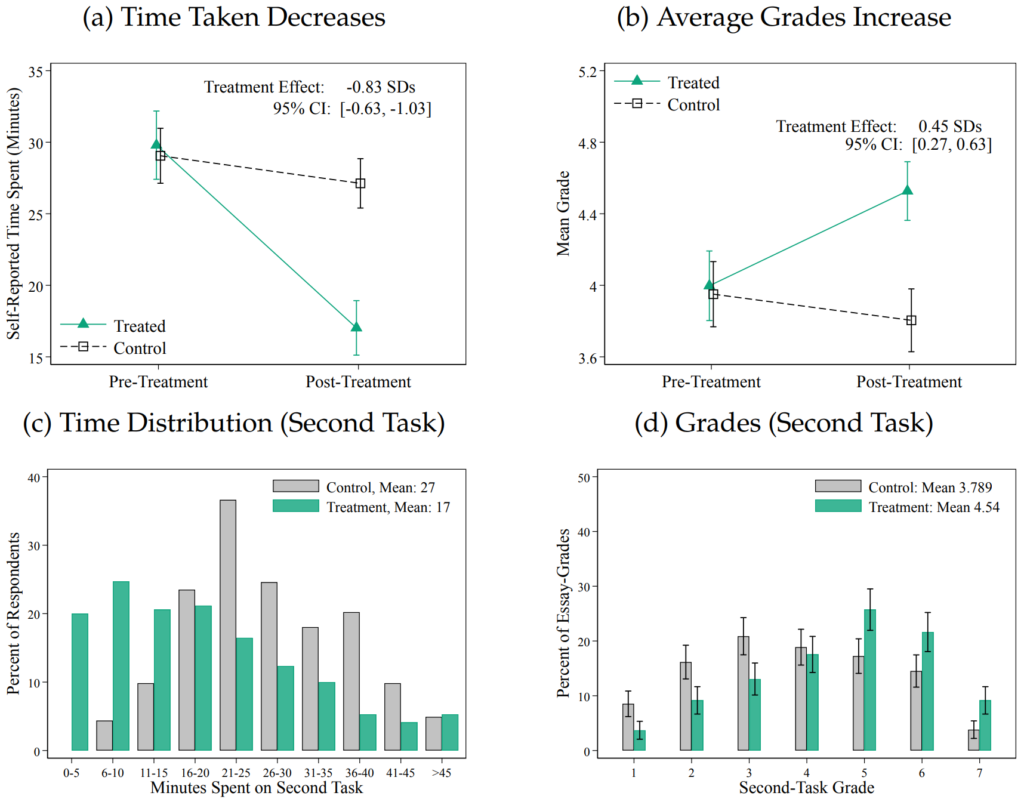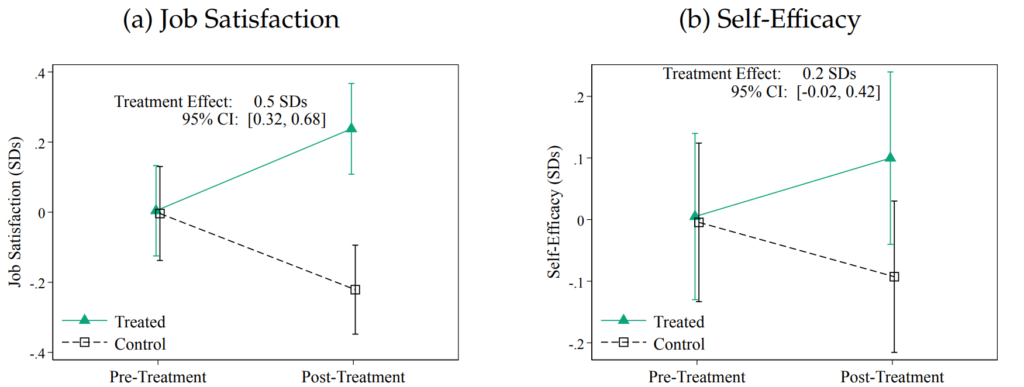In our LLM survey we investigated how US professionals use Large Language Models (LLMs) to improve productivity and work quality. This report gives you generative ai adoption statistics at work. Find out how AI tools simplify tasks and increase efficiency at all job levels.

Professionals like you across the US are integrating LLMs like ChatGPT into their daily work. You’ll see that LLMs make jobs easier and enhance efficiency and quality. The findings provide practical insights for anyone looking to use these technologies to improve their work and career.
LLM survey: Productivity
Productivity is the key reason people use AI at work, 57.0% mentioned this as the reason for using AI. In many areas of knowledge work LLMs can improve productivity by a lot. In some cases, productivity improves 30% in others 3 times!
In our AI survey we found that about a third (37.3%) of respondents use AI chatbots in their work every day. About half (46.0%) of the respondents answered that they use AI “couple of times per week.”
Accenture’s study from 2021 [page 15] found that language tasks account for 62% of total worked hours. 65% of these tasks can be automated or augmented by LLMs. This means that almost everyone should have some tasks that could be done with the help of large language models.

This is important to know for managers and business owners as people are really interested in adopting AI. Tap into this resource! Start a pilot to improve productivity, quality, and employee satisfaction in your business.
When you implement LLMs in your organization’s knowledge work you could get an initial 5 to 10% productivity increase from the low hanging fruit. Find out how.
LLM survey: Quality
Many studies and experiments have shown that content created with the help of AI tools is rated higher than the same content created by just humans. You will not just get results faster, the results are also better.

The overwhelming majority of our respondents (88.0%) said that using LLMs improves the quality of their work. In other research we can see that people with lower skill-levels get the most boost from using AI. This could lead to efficiencies in your organization, when instead of replacing people, you can improve the quality of their work and productivity.
For example in this study researchers found that ChatGPT reduces the time spent on work by 37% and improves the quality of results by an average of 18%.

Gen AI survey: Knowledge work and writing
There are a ton of tasks in every organization where people have to write. 47% mention some kind of creative writing as something they do with AI at work. LLMs are especially suited to take over the mind-numbing writing tasks. This will lead to better communication and reduced workload. Start experimenting with low-risk communication like website content, FAQs, standard customer support answers. You can get the full details in our statistics for artificial intelligence PDF.
Challenges when working with LLMs
Challenges with LLMs may hinder the adoption of AI in all areas but the change is coming. Currently, 35% of our respondents mentioned the reliability of outputs or hallucinations as the biggest problem using AI in their work. At the same time, almost all participants (88%) said that LLMs are improving the quality of their work. Managers and business owners need to understand the limitations of the tools and train their teams to work around them.
LLMs seen as positive
People see LLMs’ impact on personal career quite optimistically. Most of the respondents to our LLM survey (57.0%) saw AI as improving their productivity and saving time. At the same time, they considered LLMs to be a positive or very positive influence on their long-term career (80%). Interestingly, at the same time, most of the respondents (71.0%) thought that AI will replace some or all human labor in their field.
A study showed that ChatGPT substantially raises average productivity: time taken on a writing task decreases and output quality rises. Inequality between workers decreases, as ChatGPT compresses the productivity distribution by benefiting low-ability workers more.

ChatGPT mostly substitutes for worker effort rather than complementing worker skills, and restructures tasks towards idea-generation and editing and away from rough-drafting. Exposure to ChatGPT increases job satisfaction and self-efficacy and heightens both concern and excitement about automation technologies.
Gen AI tools like ChatGPT and others
Finally, Google Gemini is taking market share from OpenAI’s ChatGPT. 40% of our respondents said that they use this tool among other LLMs. ChatGPT is still dominant among people who use LLMs daily, but its market share will most likely continue to fall as competitors catch up.
When we also consider respondents who use several AI tools then ChatGPT is overwhelmingly the top tool with 69.0% of respondents using it. ChatGPT. More than 87.1% of respondents with university and post-graduate degrees use ChatGPT. The same is true about income levels. Among people with income above $125k more than 92.0% are ChatGPT users.
The future of LLMs and AI in general
People are rapidly adopting LLMs in their everyday tasks. There are some knowledge workers who still don’t use the possibilities of AI in their work. The late adopters fall into two main categories.
The obvious group is people who have technical difficulties, and this makes them apprehensive in using new tools in their work. This is where you can help people in your organizations with training and encouragement.
The best part of helping them catch up with their more adventurous colleagues is that lower performers get a higher boost from using LLMs in their work.
However, there are occupations where AI is less useful. We encountered a group who considers LLMs as a gimmick. They have tested the AI tools in their work and seen mediocre results. Sometimes the reason is that they are top level performers and LLMs really are not up to the level they operate in. For these people it’s beneficial to show how AI can play a supporting role for them, saving time in tedious and time-consuming tasks.
At the same time, even the top performers in a specific field may not be proficient at using LLMs in their work. They could benefit from AI support, but they don’t have the skills to get it.
To solve these problems, it is a good idea to work closely with the top performers and figure out if there’s anything LLMs could do for them. In most cases there is and it leads to higher productivity and job satisfaction.
The „but not my job“-effect
The questions about “impact on career” and “human labor replacement” have somewhat contradictory answers. People think that LLMs will significantly replace human labor but at the same time they feel that LLMs will have a positive impact on their careers. One explanation could be the “but not my job”-effect, where people see that AI can replace human labor, but it will not affect them personally.
The “but not my job”-effect could be based on the detailed personal experience we have about what we do every day. We know and understand every aspect of our own work. We see the parts where LLMs fall short and feel that these shortcomings are what is going to keep us employed.
However, when we look at what others do then we don’t have such a detailed picture. Understanding only those broad strokes we think that the tasks others do every day are easier to replace with AI tools.
But this is also true about what people know about what AIs know. For example ChatGPT financial statement analysis could often be better than human, but the human doesn’t know what AI knows and overestimates his or her skill. But for AI to create new jobs we need to focus on the parts where we are better at the moment. Conversational AI trends show that we have a bit of time to prepare.
Dive into our LLM survey report for more details about what people think about AI in their professional lives.

